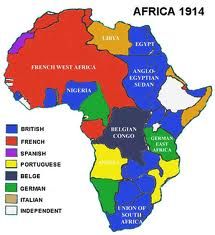7.6 New Imperialism: Motivations and Methods
3 min read•june 18, 2024
Jillian Holbrook
Jillian Holbrook
AP European History 🇪🇺
335 resourcesSee Units
New Imperialism vs. Old Imperialism
Old imperialism throughout the 16th to early 19th centuries focused mainly on “God, Glory, and Gold” as the motivations for exploration. European powers sought to establish colonies and gain control of territories primarily for economic gain and access to raw materials through military force, including the exploitation of indigenous populations and the establishment of trading posts and forts.
New imperialism refers to the period of European colonial expansion in the late 19th and early 20th centuries, during which European powers extended their control over territories through political domination and direct rule. With more advanced military technology than old imperialism, new imperialism saw Europeans center their economic, political, and cultural motivations for imperial ventures on Asia, the Middle East, and Africa.
Rather than "conquering" other nations, European powers spread their influence by establishing military bases, using colonies for cheap resources, and expanding their markets to sell manufactured goods. Colonization efforts were driven by national rivalries and competition for strategic influence. European imperialists justified overseas expansion and rule by claiming cultural and racial superiority through Social Darwinism, which coincided with the imposition of European cultural and social norms.

🎥 Watch: AP European History - 19th Century -isms
Motivations for New Imperialism
Economic 💰
Old imperialism focused on the physical endeavors of establishing a colony or searching for riches.
New imperialism searched for cheap resources, crops, or labor in order to mass manufacture goods to then sell to their domestic and foreign markets. This created large profits for imperialist nations due to extremely low costs of production and guaranteed markets in which to sell.
Religious ⛪
Protestant mission work modeled Catholic mission work as Protestant faiths grew in Europe. The Catholic Church no longer dominated European politics, and many nations under the control of Europeans were of different global religions. Protestant missionaries were seen as agents of Western civilization and often worked in close collaboration with colonial powers to try and convert indigenous peoples to their Christian faith.
Government and Political Strategy 🗳️
Europeans believed that having colonies was an important means of showing power. Old imperialism required maintaining an area as a physical colony. However, new imperialism focused on expanding influence over local governments, using colonies for military bases, establishing black markets to take over existing markets, and building railroads.
Additionally, European powers benefitted from the use of modern weaponry, including the minié ball bullet, machine guns, and the breech-loading rifle.
🎥 Watch: AP European History - Imperialism
Methods for New Imperialism
Free trade agreements allowed European nations to introduce cheap or necessary goods into another country’s market, which created a future demand for that good. Some examples included vaccines, weapons, foods, textiles, and other manufactured products.
Demand allowed European governments to establish economic influence over the countries whose markets they infiltrated by determining trading terms. The terminology “spheres of influence” described the direct or indirect involvement of European powers in another nation’s politics, economy, religion, and society.
The idea of "The White Man's Burden" under Social Darwinism caused European powers to believe that their imperialist exploitation was justified. For instance, mission civilisatrice is a French term that translates to "civilizing mission." It refers to the idea held by many French colonialists during the 19th century that it was their moral duty to bring the benefits of French civilization to non-European societies due to their superior civilization and culture. Other European powers felt the same regarding their own cultures and colonized regions or established protectorates in order to preserve their interests.
Through advances in communication and transportation, like the telegraph and steamships. Europeans had better facilitation of power over colonized regions than they did during old imperialism, allowing for increased direct control. Medicinal advancements also allowed Europeans to survive in Asia and Africa as quinine could treat malaria infections.
Browse Study Guides By Unit
🎨Unit 1 – Renaissance & Exploration
⛪️Unit 2 – Reformation
👑Unit 3 – Absolutism & Constitutionalism
🤔Unit 4 – Scientific, Philosophical, & Political Developments
🥖Unit 5 – Conflict, Crisis, & Reaction in the Late 18th Century
🚂Unit 6 – Industrialization & Its Effects
✊Unit 7 – 19th Century Perspectives & Political Developments
💣Unit 8 – 20th Century Global Conflicts
🥶Unit 9 – Cold War & Contemporary Europe
📚Study Tools
🤔Exam Skills
👉Subject Guides

© 2024 Fiveable Inc. All rights reserved.